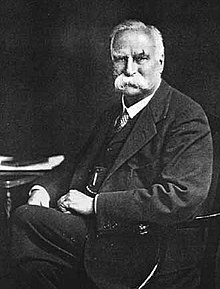
Back إدوارد باجنال بولتون Arabic ادوارد بنجل پولتون AZB Edward Bagnall Poulton Catalan Edward Bagnall Poulton Czech Edward Bagnall Poulton German Edward Bagnall Poulton Spanish ادوارد بگنال پولتن Persian Edward Bagnall Poulton French Edward Bagnall Poulton ID エドワード・ポールトン Japanese
Edward Bagnall Poulton | |
|---|---|
 Photograph by James Lafayette | |
| Born | 27 January 1856 |
| Died | 20 November 1943 (aged 87) |
| Nationality | English |
| Alma mater | Jesus College, Oxford |
| Known for | Aposematism, frequency-dependent selection, camouflage |
| Awards | Linnean Medal (1922) Hope Professor of Zoology |
| Scientific career | |
| Fields | Evolutionary biology |
| Institutions | University of Oxford |
Sir Edward Bagnall Poulton, FRS[1] HFRSE FLS (27 January 1856 – 20 November 1943) was a British evolutionary biologist, a lifelong advocate of natural selection through a period in which many scientists such as Reginald Punnett doubted its importance. He invented the term sympatric for evolution of species in the same place, and in his book The Colours of Animals (1890) was the first to recognise frequency-dependent selection. He is remembered for his pioneering work on animal coloration and camouflage, and in particular for inventing the term aposematism for warning coloration. He became Hope Professor of Zoology at the University of Oxford in 1893.[2]
- ^ Carpenter, G. D. H. (1944). "Edward Bagnall Poulton. 1856–1943". Obituary Notices of Fellows of the Royal Society. 4 (13): 655–680. doi:10.1098/rsbm.1944.0014.
- ^ "POULTON, Edward Bagnall". Who's Who. Vol. 59. 1907. p. 1421.